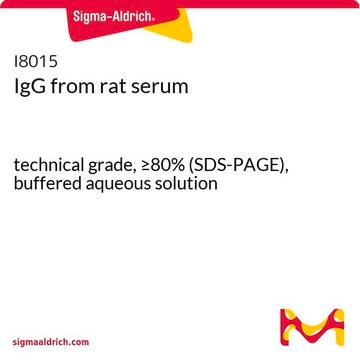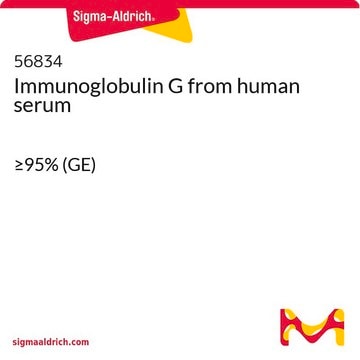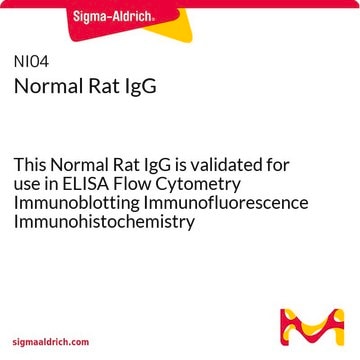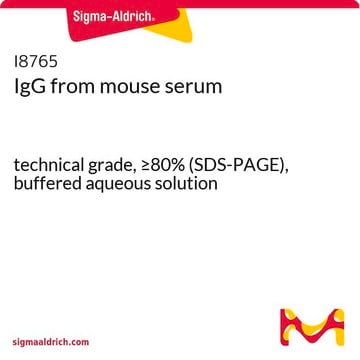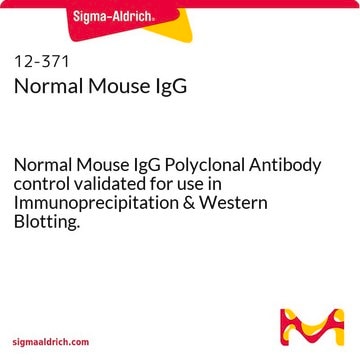I4131
IgG from rat serum
reagent grade, ≥95% (SDS-PAGE), essentially salt-free, lyophilized powder
Synonym(s):
Rat IgG
Sign Into View Organizational & Contract Pricing
All Photos(2)
About This Item
Recommended Products
conjugate
unconjugated
grade
reagent grade
Assay
≥95% (SDS-PAGE)
form
essentially salt-free, lyophilized powder
storage temp.
2-8°C
target post-translational modification
unmodified
Looking for similar products? Visit Product Comparison Guide
General description
IgG antibody subtype is the most abundant serum immunoglobulins of the immune system. It is secreted by B cells and is found in blood and extracellular fluids, Immunoglobins have two heavy (H) and two light (L) chains, linked by disulphide linkages. Each light chain comprises one variable N-terminal region and a constant C-terminal region. Heavy chain has one variable N-terminal region and three or four constant (CH1-CH4) C-terminal region. The four classes of IgG can be IgG1, IgG2, IgG3, and IgG4. IgG antibody provides protection from infections caused by bacteria, fungi and viruses. Maternal IgG is transferred to fetus through the placenta that is vital for immune defence of the neonate against infections. Rat IgG is purified from pooled normal rat serum by fractionation and ion-exchange chromatography.
Application
IgG from rat serum has been used:
- in immunolabeling
- in flow cytometry
- in enzyme linked immunosorbent assay
- as a control in neutrophil depletion assay
Biochem/physiol Actions
IgG antibody have enormous therapeutic potential and its fragment crystallizable (Fc) region contributes for the development of therapeutic antibody.
Disclaimer
Unless otherwise stated in our catalog or other company documentation accompanying the product(s), our products are intended for research use only and are not to be used for any other purpose, which includes but is not limited to, unauthorized commercial uses, in vitro diagnostic uses, ex vivo or in vivo therapeutic uses or any type of consumption or application to humans or animals.
Storage Class Code
11 - Combustible Solids
WGK
WGK 3
Flash Point(F)
Not applicable
Flash Point(C)
Not applicable
Personal Protective Equipment
dust mask type N95 (US), Eyeshields, Gloves
Certificates of Analysis (COA)
Search for Certificates of Analysis (COA) by entering the products Lot/Batch Number. Lot and Batch Numbers can be found on a product’s label following the words ‘Lot’ or ‘Batch’.
Already Own This Product?
Find documentation for the products that you have recently purchased in the Document Library.
Customers Also Viewed
D Hildeman et al.
Journal of virology, 71(12), 9672-9678 (1997-11-26)
Lymphocytic choriomeningitis virus (LCMV) infection of normal mice results in a fatal immunopathologic meningitis mediated by CD8+ cytotoxic T lymphocytes (CTL). We have previously shown that female beta2-microglobulin-deficient (beta2m-/-) mice, which are also deficient in CD8+ T cells, are susceptible
Transcription and methylation analyses of preleukemic promyelocytes indicate a dual role for PML/RARA in leukemia initiation
Gaillard C, et al.
Haematologica, 100(8), 1064-1075 (2015)
Anuj Sehgal et al.
Nature communications, 9(1), 1272-1272 (2018-03-30)
Colony-stimulating factor 1 (CSF1) controls the growth and differentiation of macrophages.CSF1R signaling has been implicated in the maintenance of the intestinal stem cell niche and differentiation of Paneth cells, but evidence of expression of CSF1R within the crypt is equivocal.
Neutrophils instruct homeostatic and pathological states in naive tissues
Casanova-Acebes M, et al.
The Journal of Experimental Medicine, 215(11), 2778-2795 (2018)
Effect of interleukin-6 receptor blockage on renal injury in apolipoprotein E-deficient mice
Tomiyama-Hanayama M et al
American Journal of Physiology: Renal Physiology, 297, F679-F684 (2009)
Our team of scientists has experience in all areas of research including Life Science, Material Science, Chemical Synthesis, Chromatography, Analytical and many others.
Contact Technical Service
